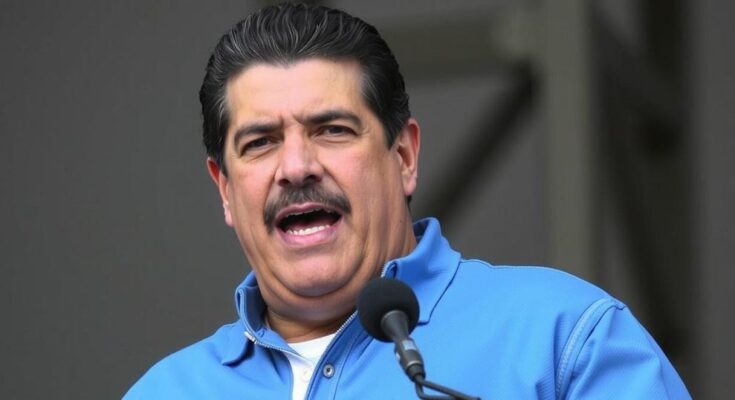Nicolás Maduro is to begin his third term in Venezuela amid allegations of a rigged election. The legitimacy of Maduro’s victory is challenged, with many believing opposition candidate Edmundo González actually won. The political climate remains tense, with calls for protests and fears of governmental reprisals, while international relations, particularly with the incoming U.S. administration, could influence Venezuela’s future.
On January 10, Venezuelan President Nicolás Maduro is set to commence his third six-year term in office, amid accusations of election fraud following the July 28 election. The event will be conducted by the congress, largely controlled by his ruling party. Maduro has claimed victory in the election by over a million votes, despite widespread belief that opposition candidate Edmundo González won by a substantial margin. The U.S.-based Carter Center, invited to monitor the elections, affirmed the legitimacy of the opposition’s tally sheets, heightening doubts about Maduro’s claim.
Critics, both within Venezuela and abroad, have expressed their concerns regarding the fairness of the election. Jason Marczak, Vice President of the Atlantic Council’s Adrienne Arsht Latin America Center, stated, “Maduro assuming another term on Friday is a blatant violation of the votes of the Venezuelan people. The published tally sheets back that up.” As Maduro prepares to take the oath of office, he will solidify a regime characterized by cronyism and economic strife, including rampant inflation and food shortages.
The opposition has called for demonstrations against Maduro’s inauguration; however, fears stemming from a governmental crackdown post-election, which led to over 2,000 arrests, may suppress public dissent. Prominent opposition leader María Corina Machado is expected to make her public return after a period of hiding to galvanize opposition forces against Maduro’s regime. Meanwhile, González, who is recognized by the United States as the legitimate president-elect, has fled to Spain to escape arrest after a judge issued a warrant against him. He has resumed his campaign for support and recently met with President Biden, describing the engagement as “long, fruitful, and cordial.”
As Maduro’s regime persists alongside a potential second term for President Trump, questions regarding U.S. policy towards Venezuela are increasingly relevant. Former U.S. diplomats and analysts caution against adopting a lenient approach towards Maduro, emphasizing the regime’s ties to organized crime and regional instability. Isaias Medina III, a former Venezuelan diplomat, cautioned, “The only negotiation between Trump and Maduro must be the liberation of Venezuela,” highlighting that stronger sanctions and decisive measures are essential for regional security.
The incoming Trump administration may consider a shift in strategy regarding Venezuela, learning from previous policies. Trump’s first term was marked by a tough stance against Maduro, leaving the future direction open to speculation. Marczak noted that the new administration is expected to support the democratic opposition while reconsidering the “maximum pressure” approach due to migration concerns as millions of Venezuelans seek refuge abroad. The Maduro regime’s recent arrests of foreign nationals, including Americans, could also serve as bargaining leverage in future negotiations with the U.S. administration.
The political climate in Venezuela remains contentious with Nicolás Maduro’s regime facing allegations of electoral manipulation. The July election saw Maduro claiming victory, prompting various organizations and opposition members to claim that the electoral process was fundamentally flawed. The international community, including the Carter Center, has scrutinized the legitimacy of the elections, questioning the authenticity of Maduro’s claims. These events have contributed to a climate of fear, stunted opposition efforts, and have implications for U.S.-Venezuela relations.
In conclusion, Nicolás Maduro is set to begin his third term in a highly disputed political landscape marked by allegations of electoral fraud and a suppressed opposition. The legitimacy of the election results remains questioned both domestically and internationally. The upcoming interactions with the U.S., particularly under a potentially renewed Trump administration, will determine the future direction of American policy towards Venezuela and its impact on regional stability. Critics stress the importance of a firm stance against Maduro’s regime to promote democratic freedoms in Venezuela.
Original Source: www.foxnews.com




